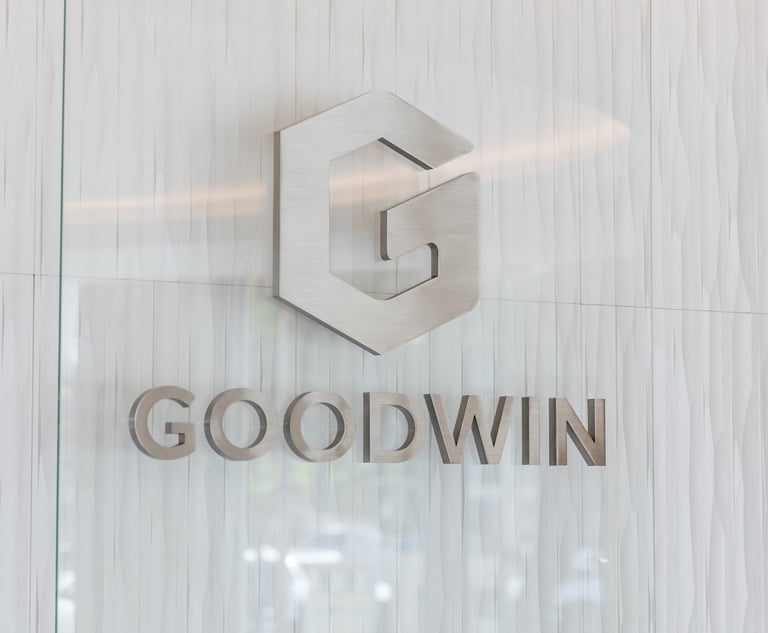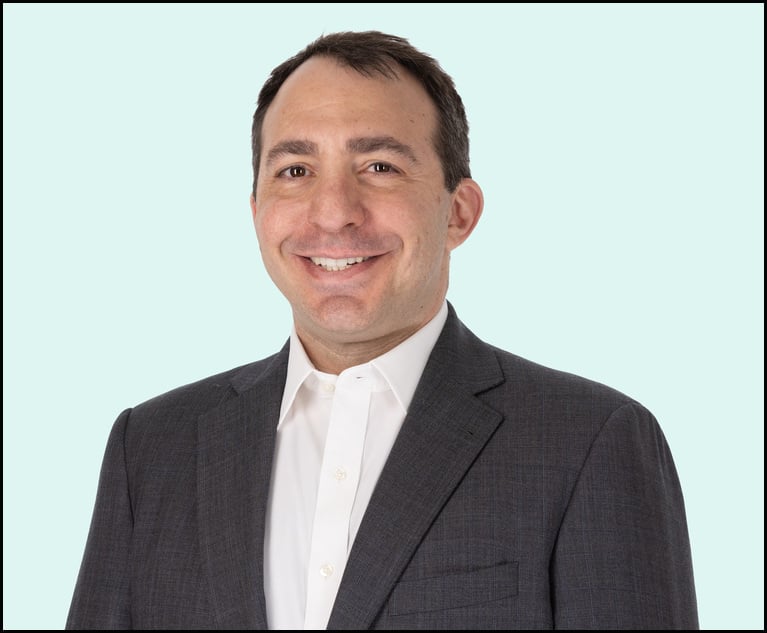Protecting Company Intellectual Property in Today's Work From Home Economy
With current work practices shifting toward remote working, and the focus of technology development moving increasingly toward computer software, the likelihood is increasing that employees may be developing valuable intellectual property rights away from their employers' offices and using their own resources.
March 25, 2022 at 02:20 PM
8 minute read
 In what circumstances might an employer have rights over an employee's invention despite the absence of a traditional written assignment agreement between the parties? The U.S. Court of Appeals for the Federal Circuit recently addressed this question in Omni MedSci v. Apple, 7 F.4th 1148 (Fed. Cir. 2021), in relation to a university professor who invented and patented certain technology during a leave of absence. Although the professor never formally assigned the patents to the university, the parties disputed whether the university's by-laws—which provided that certain inventions "shall be the property of the university"—constituted an effective assignment. While the Federal Circuit held that the phrase "shall be" indicated a mere promise to assign (rather than an effective present assignment of future-developed IP), the fact that the court considered whether to find an assignment despite the absence of a formal written agreement indicates that courts are willing to infer a transfer of employee inventions to the employer.
In what circumstances might an employer have rights over an employee's invention despite the absence of a traditional written assignment agreement between the parties? The U.S. Court of Appeals for the Federal Circuit recently addressed this question in Omni MedSci v. Apple, 7 F.4th 1148 (Fed. Cir. 2021), in relation to a university professor who invented and patented certain technology during a leave of absence. Although the professor never formally assigned the patents to the university, the parties disputed whether the university's by-laws—which provided that certain inventions "shall be the property of the university"—constituted an effective assignment. While the Federal Circuit held that the phrase "shall be" indicated a mere promise to assign (rather than an effective present assignment of future-developed IP), the fact that the court considered whether to find an assignment despite the absence of a formal written agreement indicates that courts are willing to infer a transfer of employee inventions to the employer.
This consideration has become even more critical in the modern world, where the workplace paradigm shift from in-office to work-from-home has affected the question of when an employee is "at work" and who owns the rights to such employees' inventions. Although employers are best served by having employees sign well-drafted assignment agreements, under certain circumstances employers may own the intellectual property rights relating to employees' inventions even in the absence of such an agreement. These circumstances vary based on whether patents, copyrights, or trade secrets are at issue, with some inventions (such as software) potentially implicating all three.
Ownership of Patent Rights
In the United States, patent rights are created when a patent is granted by the U.S. Patent and Trademark Office, and vest initially in the inventor(s) of the patent. Inventors may freely assign these rights to others, including their employers, both before and after the patent grants. It is therefore common for employers to have employees execute an agreement presently assigning all future patent rights to the employer at the start of employment.
This content has been archived. It is available through our partners, LexisNexis® and Bloomberg Law.
To view this content, please continue to their sites.
Not a Lexis Subscriber?
Subscribe Now
Not a Bloomberg Law Subscriber?
Subscribe Now
NOT FOR REPRINT
© 2025 ALM Global, LLC, All Rights Reserved. Request academic re-use from www.copyright.com. All other uses, submit a request to [email protected]. For more information visit Asset & Logo Licensing.
You Might Like
View All
Testing The Limits of “I Agree”: Court of Appeals Examines Clickwrap Arbitration Agreements
13 minute read
Change on the Horizon?: 2025 Begins With Numerous Patent Bills Pending
8 minute read

IP at the Frontier of AI: Navigating the New Landscape
Law Firms Mentioned
Trending Stories
- 1GOP-Led SEC Tightens Control Over Enforcement Investigations, Lawyers Say
- 2Transgender Care Fight Targets More Adults as Georgia, Other States Weigh Laws
- 3Roundup Special Master's Report Recommends Lead Counsel Get $0 in Common Benefit Fees
- 4Georgia Justices Urged to Revive Malpractice Suit Against Retired Barnes & Thornburg Atty
- 5How Gibson Dunn Lawyers Helped Assemble the LA FireAid Benefit Concert in 'Extreme' Time Crunch
Who Got The Work
J. Brugh Lower of Gibbons has entered an appearance for industrial equipment supplier Devco Corporation in a pending trademark infringement lawsuit. The suit, accusing the defendant of selling knock-off Graco products, was filed Dec. 18 in New Jersey District Court by Rivkin Radler on behalf of Graco Inc. and Graco Minnesota. The case, assigned to U.S. District Judge Zahid N. Quraishi, is 3:24-cv-11294, Graco Inc. et al v. Devco Corporation.
Who Got The Work
Rebecca Maller-Stein and Kent A. Yalowitz of Arnold & Porter Kaye Scholer have entered their appearances for Hanaco Venture Capital and its executives, Lior Prosor and David Frankel, in a pending securities lawsuit. The action, filed on Dec. 24 in New York Southern District Court by Zell, Aron & Co. on behalf of Goldeneye Advisors, accuses the defendants of negligently and fraudulently managing the plaintiff's $1 million investment. The case, assigned to U.S. District Judge Vernon S. Broderick, is 1:24-cv-09918, Goldeneye Advisors, LLC v. Hanaco Venture Capital, Ltd. et al.
Who Got The Work
Attorneys from A&O Shearman has stepped in as defense counsel for Toronto-Dominion Bank and other defendants in a pending securities class action. The suit, filed Dec. 11 in New York Southern District Court by Bleichmar Fonti & Auld, accuses the defendants of concealing the bank's 'pervasive' deficiencies in regards to its compliance with the Bank Secrecy Act and the quality of its anti-money laundering controls. The case, assigned to U.S. District Judge Arun Subramanian, is 1:24-cv-09445, Gonzalez v. The Toronto-Dominion Bank et al.
Who Got The Work
Crown Castle International, a Pennsylvania company providing shared communications infrastructure, has turned to Luke D. Wolf of Gordon Rees Scully Mansukhani to fend off a pending breach-of-contract lawsuit. The court action, filed Nov. 25 in Michigan Eastern District Court by Hooper Hathaway PC on behalf of The Town Residences LLC, accuses Crown Castle of failing to transfer approximately $30,000 in utility payments from T-Mobile in breach of a roof-top lease and assignment agreement. The case, assigned to U.S. District Judge Susan K. Declercq, is 2:24-cv-13131, The Town Residences LLC v. T-Mobile US, Inc. et al.
Who Got The Work
Wilfred P. Coronato and Daniel M. Schwartz of McCarter & English have stepped in as defense counsel to Electrolux Home Products Inc. in a pending product liability lawsuit. The court action, filed Nov. 26 in New York Eastern District Court by Poulos Lopiccolo PC and Nagel Rice LLP on behalf of David Stern, alleges that the defendant's refrigerators’ drawers and shelving repeatedly break and fall apart within months after purchase. The case, assigned to U.S. District Judge Joan M. Azrack, is 2:24-cv-08204, Stern v. Electrolux Home Products, Inc.
Featured Firms
Law Offices of Gary Martin Hays & Associates, P.C.
(470) 294-1674
Law Offices of Mark E. Salomone
(857) 444-6468
Smith & Hassler
(713) 739-1250






